模态对话框的实现原理
- 格式:docx
- 大小:39.49 KB
- 文档页数:7
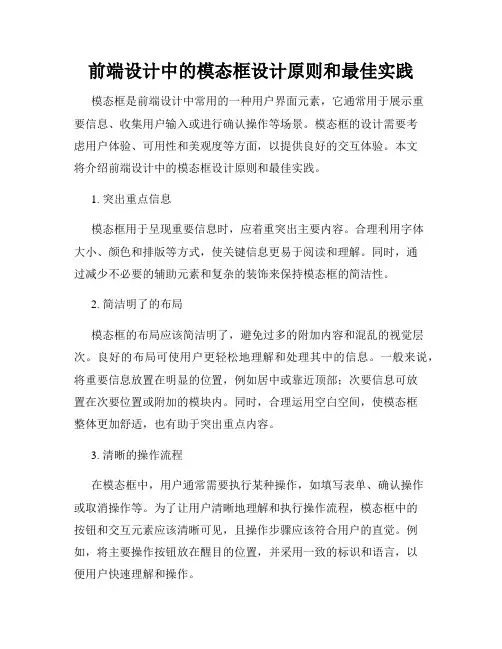
前端设计中的模态框设计原则和最佳实践模态框是前端设计中常用的一种用户界面元素,它通常用于展示重要信息、收集用户输入或进行确认操作等场景。
模态框的设计需要考虑用户体验、可用性和美观度等方面,以提供良好的交互体验。
本文将介绍前端设计中的模态框设计原则和最佳实践。
1. 突出重点信息模态框用于呈现重要信息时,应着重突出主要内容。
合理利用字体大小、颜色和排版等方式,使关键信息更易于阅读和理解。
同时,通过减少不必要的辅助元素和复杂的装饰来保持模态框的简洁性。
2. 简洁明了的布局模态框的布局应该简洁明了,避免过多的附加内容和混乱的视觉层次。
良好的布局可使用户更轻松地理解和处理其中的信息。
一般来说,将重要信息放置在明显的位置,例如居中或靠近顶部;次要信息可放置在次要位置或附加的模块内。
同时,合理运用空白空间,使模态框整体更加舒适,也有助于突出重点内容。
3. 清晰的操作流程在模态框中,用户通常需要执行某种操作,如填写表单、确认操作或取消操作等。
为了让用户清晰地理解和执行操作流程,模态框中的按钮和交互元素应该清晰可见,且操作步骤应该符合用户的直觉。
例如,将主要操作按钮放在醒目的位置,并采用一致的标识和语言,以便用户快速理解和操作。
4. 响应式和可访问性设计在现代的响应式设计中,模态框应能自适应不同的屏幕大小和设备类型,以确保在各种设备上都能提供一致的用户体验。
另外,还需考虑可访问性,确保使用辅助技术的用户也能够顺利地使用和理解模态框的内容和操作。
5. 合理的动画和过渡效果动画和过渡效果能够增强用户交互的愉悦感和可视化效果。
在模态框设计中,适度地使用动画和过渡效果可以提升用户体验,但过度使用可能会分散用户的注意力或降低页面性能。
因此,设计师需要在使用动画效果时考虑合适的方式和时机。
6. 错误处理和反馈当用户在模态框中进行输入或操作时,应提供明确的错误处理和反馈机制。
合理利用提示信息、错误提示和验证技术等方式,及时告知用户错误的原因,并给予相应的引导和修正建议。
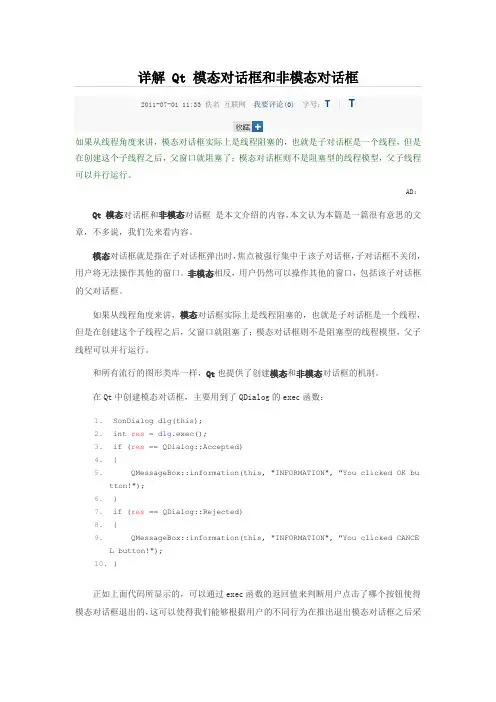
详解 Qt 模态对话框和非模态对话框2011-07-01 11:33 佚名互联网我要评论(0)字号:T | T如果从线程角度来讲,模态对话框实际上是线程阻塞的,也就是子对话框是一个线程,但是在创建这个子线程之后,父窗口就阻塞了;模态对话框则不是阻塞型的线程模型,父子线程可以并行运行。
AD:Qt 模态对话框和非模态对话框是本文介绍的内容,本文认为本篇是一篇很有意思的文章,不多说,我们先来看内容。
模态对话框就是指在子对话框弹出时,焦点被强行集中于该子对话框,子对话框不关闭,用户将无法操作其他的窗口。
非模态相反,用户仍然可以操作其他的窗口,包括该子对话框的父对话框。
如果从线程角度来讲,模态对话框实际上是线程阻塞的,也就是子对话框是一个线程,但是在创建这个子线程之后,父窗口就阻塞了;模态对话框则不是阻塞型的线程模型,父子线程可以并行运行。
和所有流行的图形类库一样,Qt也提供了创建模态和非模态对话框的机制。
在Qt中创建模态对话框,主要用到了QDialog的exec函数:1.SonDialog dlg(this);2.int res = dlg.exec();3.if (res == QDialog::Accepted)4.{5. QMessageBox::information(this, "INFORMATION", "You clicked OK button!");6.}7.if (res == QDialog::Rejected)8.{9. QMessageBox::information(this, "INFORMATION", "You clicked CANCEL button!");10.}正如上面代码所显示的,可以通过exec函数的返回值来判断用户点击了哪个按钮使得模态对话框退出的,这可以使得我们能够根据用户的不同行为在推出退出模态对话框之后采取不同的处理方法。
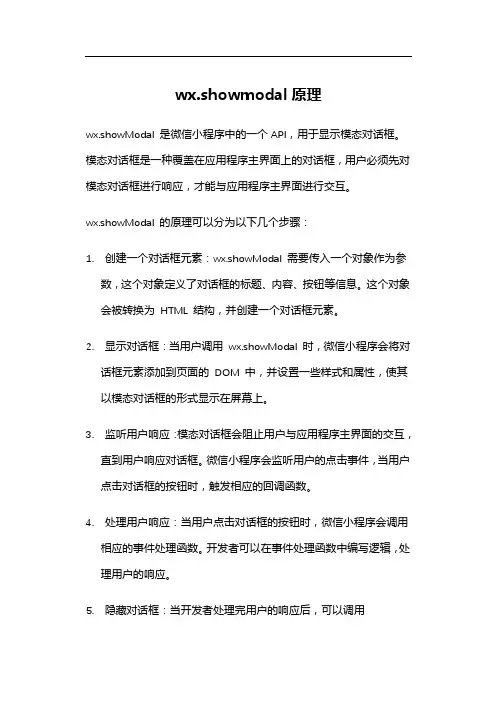
wx.showmodal原理
wx.showModal 是微信小程序中的一个API,用于显示模态对话框。
模态对话框是一种覆盖在应用程序主界面上的对话框,用户必须先对模态对话框进行响应,才能与应用程序主界面进行交互。
wx.showModal 的原理可以分为以下几个步骤:
1.创建一个对话框元素:wx.showModal 需要传入一个对象作为参
数,这个对象定义了对话框的标题、内容、按钮等信息。
这个对象会被转换为HTML 结构,并创建一个对话框元素。
2.显示对话框:当用户调用wx.showModal 时,微信小程序会将对
话框元素添加到页面的DOM 中,并设置一些样式和属性,使其以模态对话框的形式显示在屏幕上。
3.监听用户响应:模态对话框会阻止用户与应用程序主界面的交互,
直到用户响应对话框。
微信小程序会监听用户的点击事件,当用户点击对话框的按钮时,触发相应的回调函数。
4.处理用户响应:当用户点击对话框的按钮时,微信小程序会调用
相应的事件处理函数。
开发者可以在事件处理函数中编写逻辑,处理用户的响应。
5.隐藏对话框:当开发者处理完用户的响应后,可以调用
wx.hideModal 来隐藏模态对话框。
此时,微信小程序会将对话框元素从DOM 中移除,并恢复用户与应用程序主界面的交互。
wx.showModal 的使用可以方便地实现一些需要用户确认或选择的操作,例如提示用户确认、获取用户的输入等。
其核心原理是利用微信小程序的UI 组件和事件处理机制,通过创建、显示、隐藏对话框元素,以及监听、处理用户响应,实现模态对话框的功能。
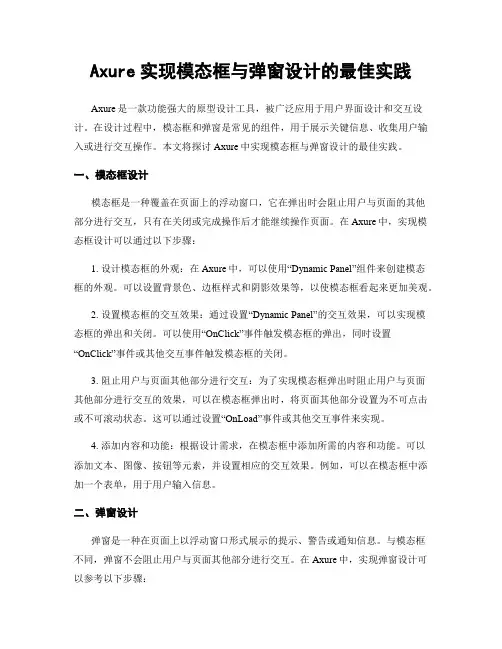
Axure实现模态框与弹窗设计的最佳实践Axure是一款功能强大的原型设计工具,被广泛应用于用户界面设计和交互设计。
在设计过程中,模态框和弹窗是常见的组件,用于展示关键信息、收集用户输入或进行交互操作。
本文将探讨Axure中实现模态框与弹窗设计的最佳实践。
一、模态框设计模态框是一种覆盖在页面上的浮动窗口,它在弹出时会阻止用户与页面的其他部分进行交互,只有在关闭或完成操作后才能继续操作页面。
在Axure中,实现模态框设计可以通过以下步骤:1. 设计模态框的外观:在Axure中,可以使用“Dynamic Panel”组件来创建模态框的外观。
可以设置背景色、边框样式和阴影效果等,以使模态框看起来更加美观。
2. 设置模态框的交互效果:通过设置“Dynamic Panel”的交互效果,可以实现模态框的弹出和关闭。
可以使用“OnClick”事件触发模态框的弹出,同时设置“OnClick”事件或其他交互事件触发模态框的关闭。
3. 阻止用户与页面其他部分进行交互:为了实现模态框弹出时阻止用户与页面其他部分进行交互的效果,可以在模态框弹出时,将页面其他部分设置为不可点击或不可滚动状态。
这可以通过设置“OnLoad”事件或其他交互事件来实现。
4. 添加内容和功能:根据设计需求,在模态框中添加所需的内容和功能。
可以添加文本、图像、按钮等元素,并设置相应的交互效果。
例如,可以在模态框中添加一个表单,用于用户输入信息。
二、弹窗设计弹窗是一种在页面上以浮动窗口形式展示的提示、警告或通知信息。
与模态框不同,弹窗不会阻止用户与页面其他部分进行交互。
在Axure中,实现弹窗设计可以参考以下步骤:1. 设计弹窗的外观:与模态框类似,可以使用“Dynamic Panel”组件来创建弹窗的外观。
根据设计需求,设置弹窗的样式、大小和位置等属性。
2. 设置弹窗的交互效果:通过设置“Dynamic Panel”的交互效果,可以实现弹窗的弹出和关闭。
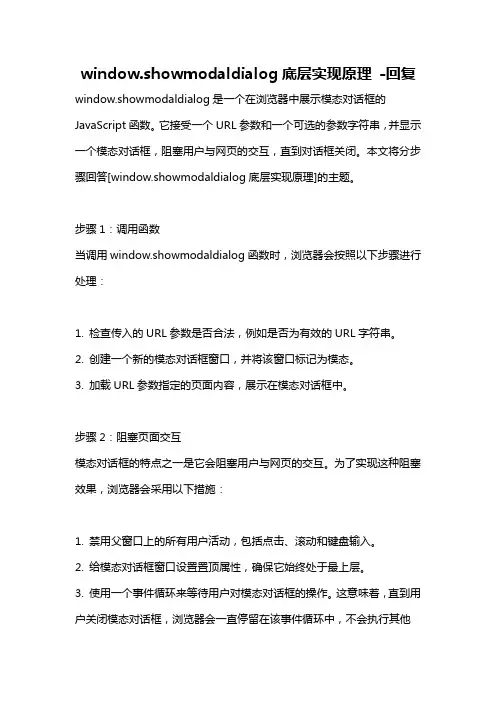
window.showmodaldialog底层实现原理-回复window.showmodaldialog是一个在浏览器中展示模态对话框的JavaScript函数。
它接受一个URL参数和一个可选的参数字符串,并显示一个模态对话框,阻塞用户与网页的交互,直到对话框关闭。
本文将分步骤回答[window.showmodaldialog底层实现原理]的主题。
步骤1:调用函数当调用window.showmodaldialog函数时,浏览器会按照以下步骤进行处理:1. 检查传入的URL参数是否合法,例如是否为有效的URL字符串。
2. 创建一个新的模态对话框窗口,并将该窗口标记为模态。
3. 加载URL参数指定的页面内容,展示在模态对话框中。
步骤2:阻塞页面交互模态对话框的特点之一是它会阻塞用户与网页的交互。
为了实现这种阻塞效果,浏览器会采用以下措施:1. 禁用父窗口上的所有用户活动,包括点击、滚动和键盘输入。
2. 给模态对话框窗口设置置顶属性,确保它始终处于最上层。
3. 使用一个事件循环来等待用户对模态对话框的操作。
这意味着,直到用户关闭模态对话框,浏览器会一直停留在该事件循环中,不会执行其他JavaScript代码。
步骤3:对话框关闭一旦用户关闭模态对话框,浏览器会执行以下操作:1. 恢复父窗口上的用户交互能力。
2. 销毁模态对话框窗口,释放内存。
步骤4:处理返回值window.showmodaldialog函数的返回值通常用于读取模态对话框中的结果。
在对话框关闭后,浏览器会将返回值传递给调用它的JavaScript代码,以便后续处理。
如果对话框没有返回值或者被用户强制关闭,则返回值为null。
综上所述,window.showmodaldialog函数的底层实现原理主要涉及创建和展示一个模态对话框窗口,阻塞用户与网页的交互,并在对话框关闭后处理返回值。
这些步骤确保了模态对话框的正确展示和用户体验。
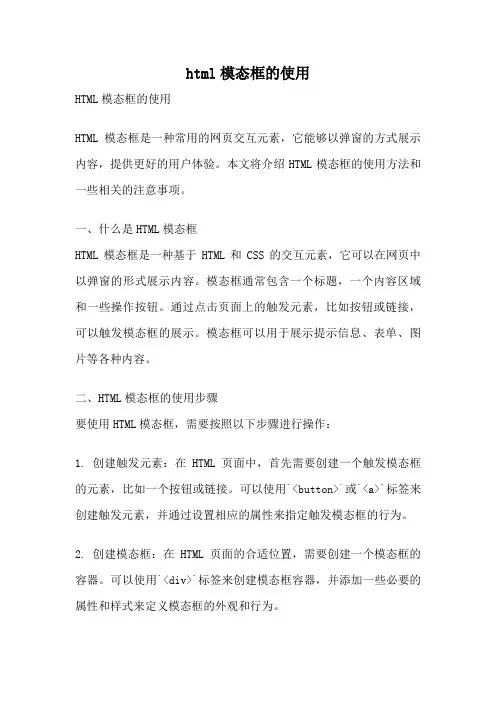
html模态框的使用HTML模态框的使用HTML模态框是一种常用的网页交互元素,它能够以弹窗的方式展示内容,提供更好的用户体验。
本文将介绍HTML模态框的使用方法和一些相关的注意事项。
一、什么是HTML模态框HTML模态框是一种基于HTML和CSS的交互元素,它可以在网页中以弹窗的形式展示内容。
模态框通常包含一个标题,一个内容区域和一些操作按钮。
通过点击页面上的触发元素,比如按钮或链接,可以触发模态框的展示。
模态框可以用于展示提示信息、表单、图片等各种内容。
二、HTML模态框的使用步骤要使用HTML模态框,需要按照以下步骤进行操作:1. 创建触发元素:在HTML页面中,首先需要创建一个触发模态框的元素,比如一个按钮或链接。
可以使用`<button>`或`<a>`标签来创建触发元素,并通过设置相应的属性来指定触发模态框的行为。
2. 创建模态框:在HTML页面的合适位置,需要创建一个模态框的容器。
可以使用`<div>`标签来创建模态框容器,并添加一些必要的属性和样式来定义模态框的外观和行为。
3. 设置模态框内容:在模态框容器中,可以添加标题、内容和操作按钮等元素来组成模态框的内容。
可以使用HTML标签来创建这些元素,并通过CSS样式来美化它们的外观。
4. 编写JavaScript代码:为了实现模态框的展示和隐藏,需要编写一些JavaScript代码。
可以使用jQuery等库来简化操作。
代码中需要监听触发元素的点击事件,并在事件处理函数中控制模态框的显示和隐藏。
5. 设置样式和效果:为了使模态框具有良好的用户体验,可以添加一些样式和效果。
比如,可以使用CSS设置模态框的位置、大小和动画效果,还可以通过JavaScript代码添加一些过渡效果和交互行为。
三、注意事项在使用HTML模态框的过程中,需要注意以下几点:1. 合理使用模态框:模态框是一种弹出式的元素,过度使用可能会影响用户体验。
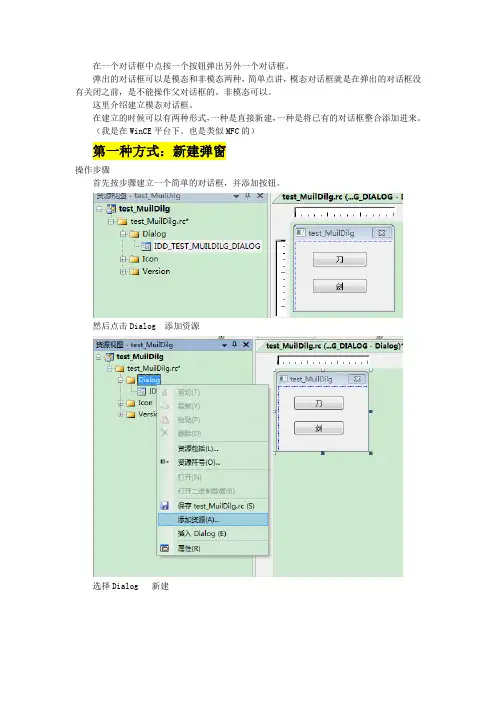
在一个对话框中点按一个按钮弹出另外一个对话框。
弹出的对话框可以是模态和非模态两种,简单点讲,模态对话框就是在弹出的对话框没有关闭之前,是不能操作父对话框的。
非模态可以。
这里介绍建立模态对话框。
在建立的时候可以有两种形式,一种是直接新建,一种是将已有的对话框整合添加进来。
(我是在WinCE平台下。
也是类似MFC的)第一种方式:新建弹窗操作步骤首先按步骤建立一个简单的对话框,并添加按钮。
然后点击Dialog添加资源选择Dialog 新建此时会出现新建好的对话框,右击选择属性可以修改名称。
设计新建的对话框在对话框上右击选择添加类填写类名称,点击完成此时在解决方案资源管理器视图中就会有新建的类,源文件及头文件将这个头文件包含到主对话框的头文件中。
然后就是调用关系的产生,双击主窗口在中的按钮,添加相应的处理函数此时调试运行,点“刀”按钮,就会弹出设计好的刀的对话框。
当然,刀对话框中的设计就是走原来熟悉的路了。
另外一个键“剑” 也是同样的步骤。
这样弹出的对话框有个问题,就是感觉弹出的对话框缩放了,字体变小了。
在对话框上右击选择属性就可以看见设置字体的选项了,修改字体即可。
下来介绍第二种方式,添加现有的窗口。
第一步:同样按部就班的建立好基本工程。
编译一下(F7)第二步:拷贝文件首先在当前工程目录下新建一个文件夹用来存放原有工程源码需要拷贝下面选中的这几个文件。
拷贝到新建的这个文件夹下。
由于现有工程中有resource.h文件,所以需要提前改一下名称,相应的WifiConfig.rc文件中有调用到这个文件,所以也要修改。
用记事本打开.rc文件,将#include “Resource.h” 改为#include “Resource_2.h”(如果是准备新建文件夹来组织代码的话就可以不用改。
就像下面这样,其实可以不用改)将这几个文件拷贝到新建的文件夹下。
还需要将原有工程res目录下的图标拷贝到现在工程的res目录下第三步:添加文件到工程首先是资源文件添加现有项,找到WiFI2Uart目录下的.rc文件。
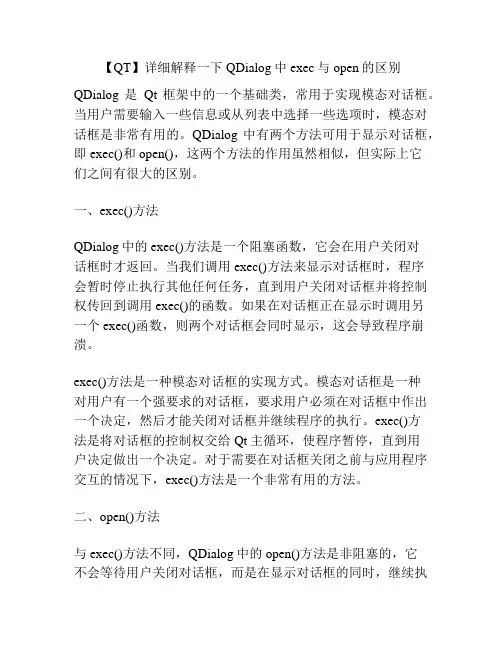
【QT】详细解释一下QDialog中exec与open的区别QDialog是Qt框架中的一个基础类,常用于实现模态对话框。
当用户需要输入一些信息或从列表中选择一些选项时,模态对话框是非常有用的。
QDialog中有两个方法可用于显示对话框,即exec()和open(),这两个方法的作用虽然相似,但实际上它们之间有很大的区别。
一、exec()方法QDialog中的exec()方法是一个阻塞函数,它会在用户关闭对话框时才返回。
当我们调用exec()方法来显示对话框时,程序会暂时停止执行其他任何任务,直到用户关闭对话框并将控制权传回到调用exec()的函数。
如果在对话框正在显示时调用另一个exec()函数,则两个对话框会同时显示,这会导致程序崩溃。
exec()方法是一种模态对话框的实现方式。
模态对话框是一种对用户有一个强要求的对话框,要求用户必须在对话框中作出一个决定,然后才能关闭对话框并继续程序的执行。
exec()方法是将对话框的控制权交给Qt主循环,使程序暂停,直到用户决定做出一个决定。
对于需要在对话框关闭之前与应用程序交互的情况下,exec()方法是一个非常有用的方法。
二、open()方法与exec()方法不同,QDialog中的open()方法是非阻塞的,它不会等待用户关闭对话框,而是在显示对话框的同时,继续执行其他任务。
当使用open()方法时,程序不会暂停,而是会立即继续执行后续代码,而不会等待用户关闭对话框并返回对话框中的结果。
open()方法将对话框作为一个独立的窗口显示,使得用户可以在对话框和程序中来回切换和进行交互。
open()方法是一种非模态对话框的实现方式。
非模态对话框与模态对话框不同,它不强制要求用户在对话框中作出决定。
相反,它仅仅是提供了一种在程序运行的同时与用户进行交互的方式。
非模态对话框适用于需要与用户进行交互,但不需要阻止用户与程序的交互的场合。
三、exec()方法和open()方法的区别虽然exec()方法和open()方法可以用来显示QDialog,但它们之间有很大的区别,它们是实现不同类型对话框的两种不同方式。
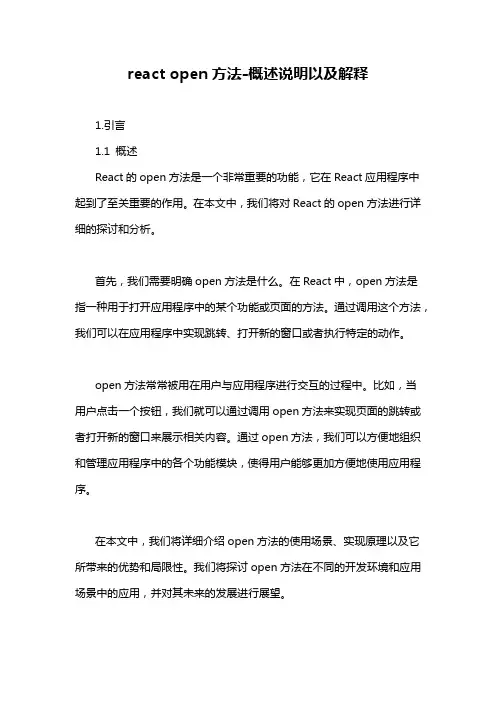
react open方法-概述说明以及解释1.引言1.1 概述React的open方法是一个非常重要的功能,它在React应用程序中起到了至关重要的作用。
在本文中,我们将对React的open方法进行详细的探讨和分析。
首先,我们需要明确open方法是什么。
在React中,open方法是指一种用于打开应用程序中的某个功能或页面的方法。
通过调用这个方法,我们可以在应用程序中实现跳转、打开新的窗口或者执行特定的动作。
open方法常常被用在用户与应用程序进行交互的过程中。
比如,当用户点击一个按钮,我们就可以通过调用open方法来实现页面的跳转或者打开新的窗口来展示相关内容。
通过open方法,我们可以方便地组织和管理应用程序中的各个功能模块,使得用户能够更加方便地使用应用程序。
在本文中,我们将详细介绍open方法的使用场景、实现原理以及它所带来的优势和局限性。
我们将探讨open方法在不同的开发环境和应用场景中的应用,并对其未来的发展进行展望。
通过阅读本文,读者将能够全面了解open方法的功能和特性,掌握open方法的使用技巧,并且能够更好地在自己的React应用程序中应用open方法来实现更好的用户交互体验。
在接下来的章节中,我们将详细介绍open方法的功能、使用场景和实现原理。
如果您对React的open方法感兴趣,那么请继续阅读本文,我们将带您深入了解!1.2 文章结构:本文将围绕React中的open方法展开讨论。
文章将分为以下几个部分进行论述:1. 引言:在引言部分,将对React和其核心概念进行简要介绍,介绍React在前端开发中的广泛应用以及其重要性。
同时,引言还将概述本文的目的和结构。
2. 正文:正文部分将重点讨论React中的open方法。
首先,将详细介绍open方法的功能,包括其在React中的具体作用和用途。
其次,会列举并探讨open方法在不同场景下的使用案例,以帮助读者更好地理解和应用该方法。
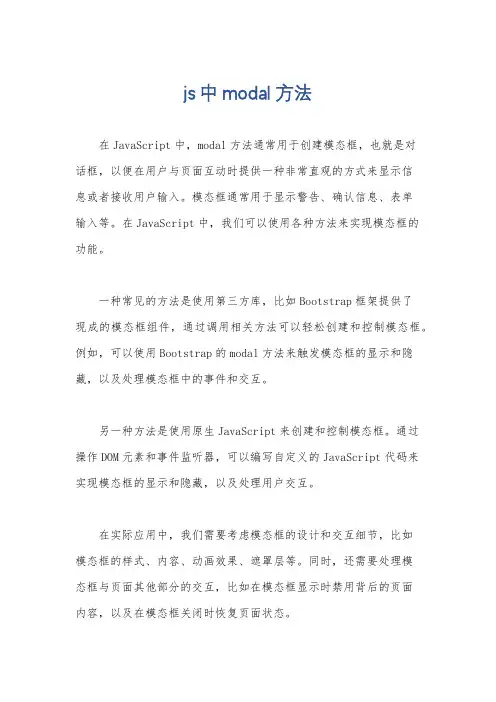
js中modal方法
在JavaScript中,modal方法通常用于创建模态框,也就是对
话框,以便在用户与页面互动时提供一种非常直观的方式来显示信
息或者接收用户输入。
模态框通常用于显示警告、确认信息、表单
输入等。
在JavaScript中,我们可以使用各种方法来实现模态框的
功能。
一种常见的方法是使用第三方库,比如Bootstrap框架提供了
现成的模态框组件,通过调用相关方法可以轻松创建和控制模态框。
例如,可以使用Bootstrap的modal方法来触发模态框的显示和隐藏,以及处理模态框中的事件和交互。
另一种方法是使用原生JavaScript来创建和控制模态框。
通过
操作DOM元素和事件监听器,可以编写自定义的JavaScript代码来
实现模态框的显示和隐藏,以及处理用户交互。
在实际应用中,我们需要考虑模态框的设计和交互细节,比如
模态框的样式、内容、动画效果、遮罩层等。
同时,还需要处理模
态框与页面其他部分的交互,比如在模态框显示时禁用背后的页面
内容,以及在模态框关闭时恢复页面状态。
总之,JavaScript中的modal方法是用来创建和控制模态框的功能,可以通过第三方库或者原生JavaScript来实现,需要考虑设计和交互细节,以及与页面其他部分的交互。
希望这个回答能够满足你的需求。

modal.alert的原理-回复modal.alert是一种在网页中常用的JavaScript函数,它用于显示一个警告框,并在用户点击确认按钮后关闭。
这个函数常用于在网页上显示重要的提示信息或警告用户当前操作可能引发的问题。
在本文中,我将详细介绍modal.alert的原理及其实现步骤。
1. modal.alert的概述:modal指的是模态,即用户必须对警告框的内容做出反应后才能继续操作页面。
alert则是弹窗的一种形式,用于向用户展示提示信息。
结合起来,modal.alert即为一种模态的弹窗函数,它通过JavaScript实现,以便在用户需要注意的情况下,向其展示重要的信息或警示。
2. modal.alert的工作原理:modal.alert的实现过程可以分为以下几个步骤:- 创建弹窗容器:首先,需要创建一个用于显示弹窗内容的容器。
这个容器可以是一个Div元素,可以通过HTML和CSS来定义其样式和位置。
- 显示弹窗内容:通过JavaScript代码,将要展示的提示信息或警告内容添加到弹窗容器中。
可以通过操作DOM元素来动态地向容器中添加和修改内容。
- 设置模态效果:为了使得弹窗成为模态窗口,需要在弹窗显示的同时,锁定页面上的其他操作。
这可以通过在弹窗显示时添加一个透明的背景遮罩层,并设置遮罩层的z-index属性为高于其他元素,以防止用户直接操作页面上的其他元素。
- 展示弹窗:通过JavaScript代码,将弹窗容器设置为可见状态,使其显示在用户的屏幕上。
可以使用CSS属性来控制弹窗的位置、大小和样式。
- 监听用户反应:在弹窗显示后,需要等待用户对弹窗内容做出反应。
这可以通过JavaScript代码来监听用户的操作,如点击确认按钮。
- 关闭弹窗:根据用户的反应,可以通过JavaScript代码来关闭弹窗。
这可以是用户点击确认按钮后,直接将弹窗容器设置为不可见状态,或者在用户点击其他区域时自动关闭弹窗。
调用一个新的对话框的方法注意:这里是插入窗体。
一、模态对话框1) 首先,新建的一个对话框,假如为test2) 在刚才插入的子窗口添加消息映射函数void C***Dll::PostNcDestroy() ,在次函数里面添加:delete this;3) 在需要调用新建对话框的CPP 文件添加头文件#include "test.h"4) 然后在需要调用新建对话框的按钮的成员函数里写上:AFX_MANAGE_STATE(AfxGetStaticModuleState());test testDlg;testDlg.DoModal();二、非模态对话框1) 首先,插入一个窗体,假如为CFrmDl ;2) 在刚才插入的子窗口添加消息映射函数void C***Dll::PostNcDestroy() ,在次函数里面添加:delete this;3) 在需要调用新建对话框的CPP 文件添加头文件#include "FrmDll.h" ;4) 然后在需要调用新建对话框的按钮的成员函数里写上:AFX_MANAGE_STATE(AfxGetStaticModuleState());CFrmDll *dlg = new CFrmDll; // 在内存中new 出来dlg->Create(IDD_FRMDLLDlg); // 创建对话框,dlg->CenterWindow(); // 窗口居中dlg->ShowWindow(SW_SHOW); // 显示窗口非模态Dll 调用例子:typedef void ( * P_show)();HINSTANCE hinstance =NULL;void CTestDlgDlg::OnButton1(){if (hinstance ==NULL){hinstance = LoadLibrary ("dllPro.dll");}if(hinstance ==NULL){AfxMessageBox("Fail");return;}P_show show = (P_show)::GetProcAddress (hinstance,"showdlg");show();// FreeLibrary(hinstance); // 这个记得放在析构函数里面// hinstance = NULL; // 这个记得放在析构函数里面}。
window.showmodaldialog底层实现原理1. 引言1.1 概述本文将详细探讨JavaScript中的一个重要方法——window.showmodaldialog 的底层实现原理。
showmodaldialog方法作为一种常见的对话框显示方式,具有广泛的应用场景。
通过深入了解其工作原理,我们可以更好地理解其实现机制,并且能够在实际开发中更加灵活地运用它。
1.2 文章结构本文将分为五个部分进行讲解。
首先,在引言部分,我们将对文章的主题和目录进行简要介绍。
接下来,在第二部分,我们将介绍showmodaldialog方法的作用和基本用法。
在第三部分中,我们将深入研究showmodaldialog方法的底层实现原理,对其中涉及的DOM操作和事件处理机制、JavaScript线程与调用栈控制以及页面渲染与布局计算过程进行详细分析。
在第四节中,我们将探讨showmodaldialog方法的应用场景以及它所存在的限制和问题。
最后,在结论部分,我们将总结归纳showmodaldialog方法的实现原理和应用范围,并展望其未来发展前景,同时给出替代方案使用建议。
1.3 目的通过撰写这篇长文,我们的目标是深入了解和分析showmodaldialog方法的底层实现原理,帮助读者更好地理解和应用这一方法。
同时,我们将介绍该方法的应用场景,并探讨其存在的限制和问题。
通过全面而深入的讲解,我们希望读者能够在实际开发中灵活运用showmodaldialog方法,并能够根据具体情况选择合适的替代方案。
2. window.showmodaldialog底层实现原理:2.1 showmodaldialog的作用:`showmodaldialog()`是JavaScript中的一个方法,它可以在当前窗口打开一个模态对话框。
模态对话框是指弹出的窗口会阻止用户与原始页面进行交互,直到用户关闭该窗口为止。
因此,`showmodaldialog()`提供了一种便捷的方式来显示一个需要用户输入或进行选择的窗口。
JavaFX是一种用于创建丰富、交互式用户界面的软件评台,它提供了丰富的图形图像以及多种多样的交互功能。
在JavaFX中,stage是顶层容器,它充当了整个JavaFX应用程序的主要容器,负责承载应用程序的所有内容。
而在stage中,又存在着模态的概念,即模态对话框,它与普通对话框有所不同,可以阻止用户与应用程序的其他部分进行交互。
在本文中,将对JavaFX中stage的模态原理进行深入分析,并进一步探讨模态对话框的实现原理和应用场景。
同时也将介绍如何在JavaFX 应用程序中使用模态对话框,以及在实际开发中的一些注意事项和技巧。
一、 JavaFX中stage的概念和作用1. stage的概念在JavaFX中,stage是作为顶层容器存在的,它负责承载整个应用程序的内容,包括场景和所有的控件。
在stage中,用户可以对窗口进行最小化、最大化和关闭等操作,因此它可以看作是JavaFX应用程序的主要容器。
2. stage的作用Stage在JavaFX中扮演着非常重要的角色,它不仅仅是一个容器,还承载了整个应用程序的生命周期和事件处理。
通过stage,开发者可以创建一个完整的应用窗口,自由地管理窗口的布局、大小和外观等。
二、 JavaFX中模态的概念和作用1. 模态窗口的概念模态窗口是指在打开的时候,会阻止用户与应用程序的其他部分进行交互,直到关闭该窗口为止。
与之相对应的是非模态窗口,它在打开的时候不会阻止用户与应用程序的其他部分进行交互,用户可以自由地切换和操作。
2. 模态窗口的作用模态窗口常用于在应用程序中展示一些重要的信息或者需要用户立即处理的任务,比如确认对话框、错误提示框等。
通过模态窗口,可以有效地阻止用户在处理重要信息的时候进行其他操作,确保用户专注于当前的任务。
三、 JavaFX中模态对话框的实现原理1. 模态对话框的显示在JavaFX中,可以通过调用Stage类的initModality()方法来设置窗口的模态类型。
element this.$confirm 原理`this.$confirm` 是一个 Vue 插件(如 `element-ui`)提供的方法,主要用于创建一个确认提示框。
当调用此方法时,会弹出一个包含确定和取消按钮的对话框,用户需要选择确认或取消来继续执行后续代码。
这个方法实现的原理是:1. 接收一个配置对象作为参数,其中可以自定义各种选项以满足项目需求。
例如,可以设置弹窗的标题、提示信息、按钮文本和样式等。
2. 在内部创建了一个模态对话框组件,该组件包含了一个遮罩层和一个对话框容器。
3. 通过 CSS 样式控制模态对话框的位置、大小、背景色等属性,使其覆盖整个页面并聚焦于当前操作的元素上。
4. 在对话框容器中添加了确定和取消两个按钮,并为它们绑定了相应的事件处理函数。
5. 当用户点击确定或取消按钮时,会触发对应的事件处理函数,从而执行后续代码。
6. 如果用户没有进行任何操作,则在一定时间后自动关闭弹窗。
具体的使用方式如下:```javascriptthis.$confirm({message: '是否确认删除选中数据', // 提示信息title: '提示', // 弹窗标题confirmButtonText: '确定', // 确定按钮文本cancelButtonText: '取消', // 取消按钮文本cancelButtonClass: 'btn-cancel', // 取消按钮样式confirmButtonClass: 'btn-confirm', // 确定按钮样式type: 'warning' // 警告类型弹窗}).then(() => {// 确认按钮的回调函数}).catch(() => {// 取消按钮的回调函数});```此外,根据需求可以进行弹框内部的自定义内容或样式,例如交换取消和确定按钮的位置。
MFC 模态对话框的实现原理1人收藏此文章, 发表于10个月前(2012-09-30 11:20) , 已有471次阅读,共1个评论1. 模态对话框在涉及GUI程序开发的过程中,常常有模态对话框以及非模态对话框的概念模态对话框:在子界面活动期间,父窗口是无法进行消息响应。
独占用户输入非模态对话框:各窗口之间不影响主要区别:非模态对话框与APP共用消息循环,不会独占用户。
模态对话框独占用户输入,其他界面无法响应在用户层的主要逻辑如下:TestDlg dlg;if (dlg.DoModal() == IDOK){//处理完毕后的操作}.......//后续处理在具体实现中,有如下几个步骤:1. 让父窗口失效EnableWindow(parentWindow, FALSE)2. 建立模态对话框自己的消息循环(RunModalLoop)3. 直至接收关闭消息,消息循环终止,并销毁窗口。
INT_PTR CDialog::DoModal(){//对话框资源加载......//在创建模态窗口之前先让父窗口失效,不响应键盘、鼠标产生的消息HWND hWndParent = PreModal();AfxUnhookWindowCreate();BOOL bEnableParent = FALSE;if (hWndParent && hWndParent != ::GetDesktopWindow()&& ::IsWindowEnabled(hWndParent)){::EnableWindow(hWndParent, FALSE);bEnableParent = TRUE;.......}//创建模态窗口,并进行消息循环,若窗口不关闭,则循环不退出AfxHookWindowCreate(this);VERIFY(RunModalLoop(dwFlags) == m_nModalResult);//窗口关闭,销毁窗口DestroyWindow();PostModal();//释放资源,并让父窗口有效pMainWnd->EnableWindow(TRUE);//返回return m_nModalResult;}2. 模态窗口中的消息循环int CWnd::RunModalLoop(DWORD dwFlags){//要检查窗口状态是否是模态窗口//若状态一直为模态,则一直进行消息循环for (;;){ASSERT(ContinueModal());// phase1: check to see if we can do idle workwhile (bIdle &&!::PeekMessage(pMsg, NULL, NULL, NULL,PM_NOREMOVE)){ASSERT(ContinueModal());// show the dialog when the message queue goes idleif (bShowIdle){ShowWindow(SW_SHOWNORMAL);UpdateWindow();bShowIdle = FALSE;}// call OnIdle while in bIdle stateif (!(dwFlags & MLF_NOIDLEMSG) && hWndParent != NULL && lIdleCount == 0){// send WM_ENTERIDLE to the parent::SendMessage(hWndParent,WM_ENTERIDLE, MSGF_DIALOGBOX, (LPARAM)m_hWnd);}if ((dwFlags & MLF_NOKICKIDLE) ||!SendMessage(WM_KICKIDLE,MSGF_DIALOGBOX, lIdleCount++)){// stop idle processing next timebIdle = FALSE;}}//在有消息的情况下取消息处理do{ASSERT(ContinueModal());// pump message, but quit on WM_QUITif (!AfxPumpMessage()){AfxPostQuitMessage(0);return -1;}// show the window when certain special messages rec'dif (bShowIdle &&(pMsg->message == 0x118 || pMsg->message == WM_SYSKEYDOWN)){ShowWindow(SW_SHOWNORMAL);UpdateWindow();bShowIdle = FALSE;}if (!ContinueModal())goto ExitModal;// reset "no idle" state after pumping "normal" messageif (AfxIsIdleMessage(pMsg)){bIdle = TRUE;lIdleCount = 0;}} while (::PeekMessage(pMsg, NULL, NULL, NULL,PM_NOREMOVE));}ExitModal:m_nFlags &= ~(WF_MODALLOOP|WF_CONTINUEMODAL);return m_nModalResult;}GetMessage与PeekMessage的区别:GetMessage:用于从消息队列读取消息。
若队列中没有消息,GetMessage将导致线程阻塞。
PeekMessage:检测队列中是否有消息,并立即返回,不会导致阻塞。
3. APP中的消息循环//thrdcore.cpp// main running routine until thread exitsint CWinThread::Run(){// for tracking the idle time stateBOOL bIdle = TRUE;LONG lIdleCount = 0;//消息读取乃至分发当为WM_QUIT时,退出循环for (;;){//检查是否为空闲时刻while (bIdle &&!::PeekMessage(&m_msgCur, NULL, NULL, NULL,PM_NOREMOVE)){// call OnIdle while in bIdle stateif (!OnIdle(lIdleCount++))bIdle = FALSE; // assume "no idle" state}//有消息,读消息并分发do{// pump message, but quit on WM_QUITif (!PumpMessage())return ExitInstance();// reset "no idle" state after pumping "normal" messageif (IsIdleMessage(&m_msgCur)){bIdle = TRUE;lIdleCount = 0;}}while (::PeekMessage(&m_msgCur, NULL, NULL, NULL,PM_NOREMOVE));}}4. 模态对话框中局部消息循环和APP全局消息循环的关系4.1 APP消息循环和模态对话框中局部消息循环的关系根据上图可以看出,在APP的消息循环再派发ONOK消息后,调用ModalDlg的响应函数,pWnd->OnOk();在该消息中,会进入模态对话框的消息循环,除非将模态对话框关闭,否则APP的DispatchMessage函数一直出不来。
一旦创建了模态对话框,进行局部消息循环,那么APP的消息循环就被阻断。
整个程序的消息循环有模态对话框中得消息循环取代。
所以给父窗口发送的非窗口消息,一样可以响应。
由于局部消息循环只在对话框中的一个响应函数中,而全局的消息循环也被阻断,局部循环一直运行,如果用户不进行处理并关闭模态对话框,该循环会一直不退出。
其他对话框也得不到处理。
4.2 局部消息循环存在的必要性我之前一直有这样一个疑问,觉得模态对话框中的局部消息循环没有必要,可以通过如下方式达到模态对话框的效果:pParentWnd->EnableWindow(FALSE);CDialog *pDlg;pDlg = new CDialog();pDlg->Create();pDlg->Show();pParentWnd->EnableWindow(TRUE);并且做了个实验,貌似OK。
但是这边有个疏漏的是,模态对话框的作用有两个:1. 使父窗口失效,无法响应用户的输入2. 在当前窗口为处理完毕时,禁止进入后续操作。
上述例子只达到了要求1,没有达到要求二所以模态对话框中有如下代码:if (dlg.DoModal() == IDOK)若对话框没有关闭,是无法进行后续操作的。
但是按照我先前的理解,如果代码是这样的:void CAppDoModelTestApp::OnTestModaltest(){CWnd* pMainWnd = AfxGetMainWnd();pMainWnd->EnableWindow(FALSE);m_pTestDlg1 = new CModalDlg();m_pTestDlg1->Create(IDD_DIALOG1);m_pTestDlg1->ShowWindow(SW_SHOW);m_pTestDlg2 = new CModalDlg();m_pTestDlg2->Create(IDD_DIALOG1);m_pTestDlg2->ShowWindow(SW_SHOW);}在对话框TestDlg1后产生后,TestDlg2一样会出现。
但是我们模态对话框希望的效果是:在TestDlg1未关闭前,TestDlg2不创建。
所以此处体现出了局部消息循环的优势,就是在当前窗口为处理完毕时,一直循环,拒绝进入后续代码中。